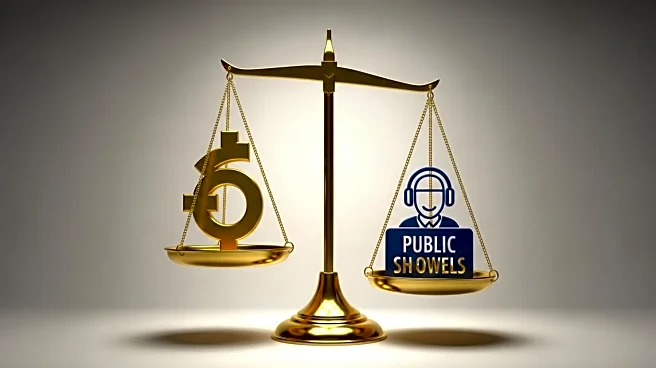What's Happening?
The U.S. government shutdown has entered its third week, with President Trump and Congress at an impasse over funding. The shutdown has resulted in the closure of federal agencies, affecting services such as flight operations, IRS taxpayer help lines, and national parks. Approximately 750,000 federal workers have been furloughed, while those essential to national security continue to work without pay. The shutdown has also led to missed paychecks for military personnel, although President Trump has ordered the Pentagon to redirect funds to cover military payroll. Civilian employees, however, are not guaranteed back pay once the shutdown ends. The economic impact is beginning to be felt nationwide, with food banks and community service organizations preparing for increased demand as federal resources dwindle.
Why It's Important?
The ongoing shutdown poses significant risks to the U.S. economy and public welfare. The absence of government services and missed paychecks are expected to ripple through communities, affecting consumer spending and financial stability. The previous shutdown during Trump's first term resulted in an $11 billion loss in economic output, highlighting the potential for similar economic damage. Vulnerable populations, including those relying on food banks and federal assistance, are particularly at risk. The shutdown also threatens to exacerbate staffing shortages in critical areas like air traffic control, potentially leading to increased flight delays and safety concerns.
What's Next?
If the shutdown continues, the economic and social impacts are likely to worsen. Federal workers and their families may face increased financial strain, leading to broader economic repercussions. Political leaders are under pressure to reach a compromise to end the shutdown, but the deadlock persists. Community organizations and food banks are preparing to support those affected, but their resources are limited. The situation demands urgent attention from lawmakers to prevent further damage to the economy and public services.
Beyond the Headlines
The shutdown highlights deeper issues within the U.S. political system, including the challenges of bipartisan cooperation and the impact of political decisions on everyday citizens. The reliance on federal funding for essential services underscores the vulnerability of communities during political crises. Long-term solutions may require reevaluating government funding mechanisms and ensuring more resilient support systems for affected populations.











